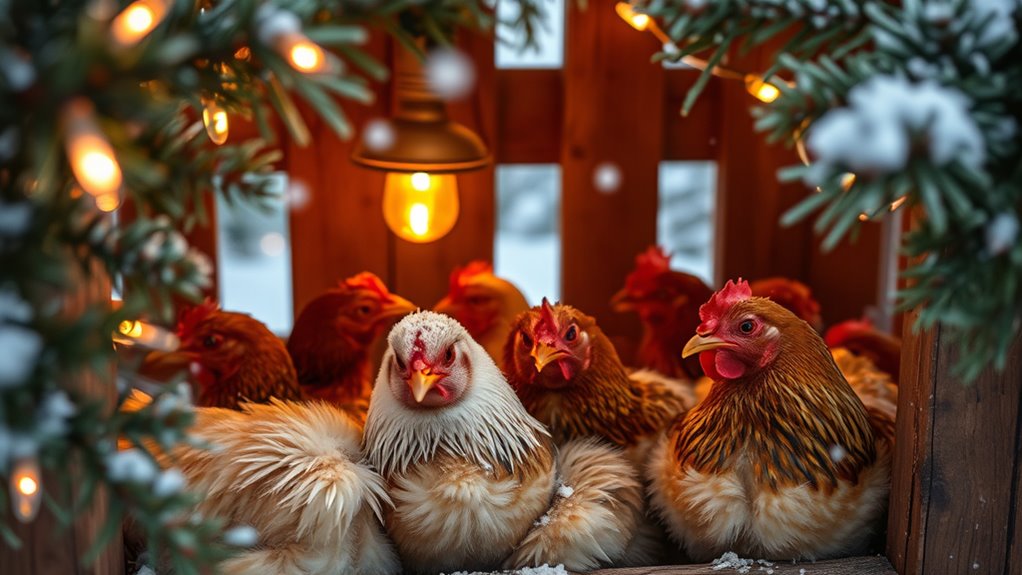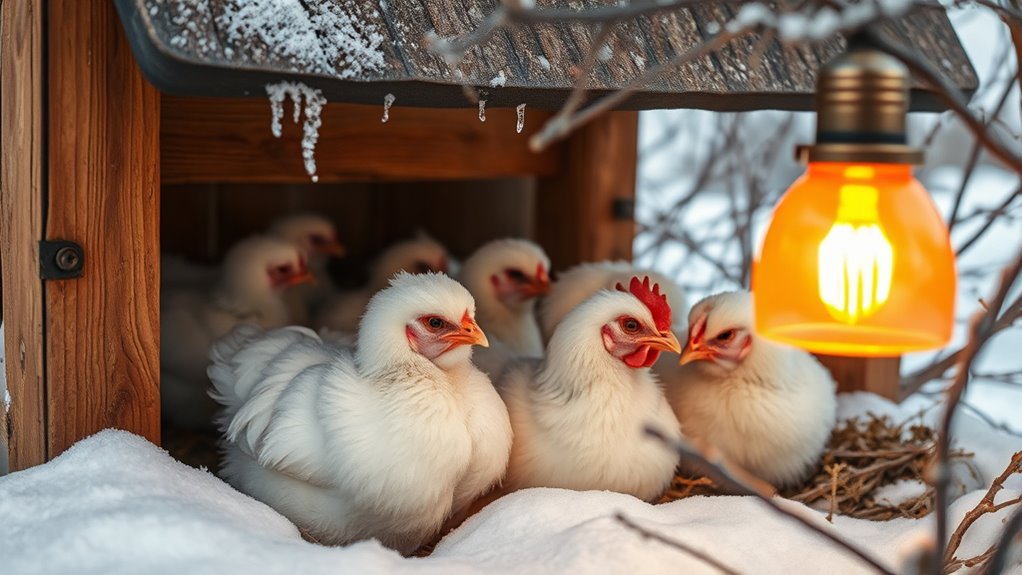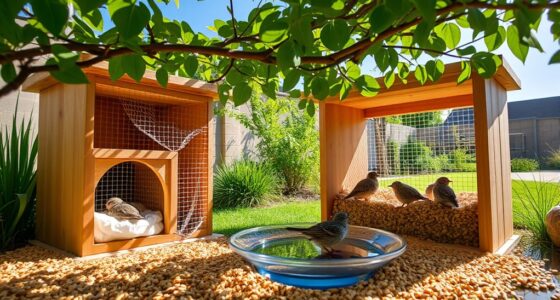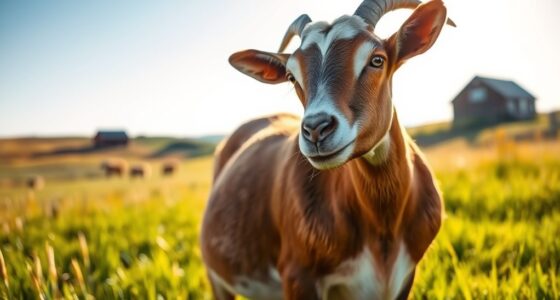To keep your backyard chickens warm during winter, focus on providing a well-insulated coop with dry, deep bedding to trap heat and prevent drafts. Maintain their feathers with a balanced diet rich in nutrients and make certain they stay clean and parasite-free. Proper ventilation is key to prevent moisture build-up without creating cold drafts. Regularly inspect for leaks and moisture issues—following these tips will help your flock stay cozy all season long. Keep going to learn more practical winter care tips.
Key Takeaways
- Ensure chickens have a balanced, protein-rich diet with vitamins to support feather health and insulation.
- Insulate the coop properly and keep bedding dry and deep to retain warmth.
- Use high vents and adjustable airflow to prevent moisture buildup while avoiding cold drafts.
- Seal leaks and add windbreaks around the coop to shield chickens from harsh winter winds.
- Address feather damage or molting with supplemental warmth and dust baths to maintain insulation.

As winter approaches, preparing your backyard chickens for the colder months is essential to keep them healthy and productive. One of the key aspects of winter care is guaranteeing your flock maintains their feather quality. Feathers act as natural insulators, trapping warm air close to your chickens’ bodies. To support feather maintenance, make sure your birds have a balanced diet rich in proteins and essential nutrients. Proper nutrition helps them grow and retain healthy feathers, which are indispensable for insulation in cold weather. Additionally, check that their feathers are clean and free of mites or parasites, as these can damage feathers and reduce their insulating properties. If you notice any feather damage or molting, consider providing supplemental warmth or a dust bath with diatomaceous earth to keep feathers in the best condition. Maintaining feather quality is crucial for the overall health of your flock during winter months. Providing access to vitamins and minerals can also support their immune health and resilience against cold stress. Regularly inspecting your chickens’ feathers and overall condition can help catch issues early and ensure they remain well-insulated against the cold. Good coop insulation can further help maintain stable temperatures and reduce heat loss. Along with feather maintenance, managing ventilation strategies in your coop becomes even more critical during winter. Proper ventilation prevents moisture buildup, which can lead to frostbite and respiratory issues. However, it’s equally important to avoid drafts that can chill your chickens. You want to strike a balance: fresh air flowing through the coop without creating cold drafts directly hitting your birds. To achieve this, position vents high on the walls or roof, where warm, moist air can escape without blowing directly on the roosting areas. Use adjustable vents so you can regulate airflow as weather conditions change. Adding a simple barrier or windbreak outside the coop can also help shield it from harsh winter winds, reducing overall drafts. Make sure your coop is well-ventilated but still retains enough warmth, especially around roosts where your chickens sleep during the night. Proper ventilation strategies will reduce condensation and dampness, which are common causes of frostbite and respiratory problems in cold weather. Regularly inspecting the coop for drafts, moisture, and cleanliness is essential during winter. Keep bedding dry and deep enough to provide insulation, and clean out any mold or excess moisture that accumulates. By combining effective feather maintenance with strategic ventilation, you create a cozy environment that supports your chickens’ health and productivity throughout the cold months. Remember, chickens are surprisingly resilient when given the right conditions. Providing them with a well-insulated coop, good nutrition, and careful airflow management will help guarantee they stay warm, healthy, and happy all winter long.
Frequently Asked Questions
How Can I Prevent Frostbite on My Chickens’ Combs?
To prevent frostbite on your chickens’ combs, focus on comb protection and frostbite prevention strategies. You can apply a small amount of petroleum jelly to their combs to create a barrier against moisture and cold. make certain they have a dry, draft-free coop with proper ventilation. Limit outdoor exposure during extreme cold, and consider providing additional warmth. These steps help keep their combs healthy and frostbite-free during winter.
What Are the Signs of Hypothermia in Backyard Chickens?
You might notice your chickens huddling together or acting unusually sluggish, which are signs of hypothermia. If their behavior shifts to shivering or they become unresponsive, early detection is vital. Keep an eye on their combs and wattles for pale or bluish coloration, indicating cold stress. Recognizing these signs quickly helps you act fast, ensuring your flock stays warm and healthy during cold weather.
Is It Necessary to Increase Feed During Winter?
You should increase your chickens’ winter feeding to help them stay warm and healthy. During winter, their energy needs rise, so offering more feed ensures they get enough calories. Incorporate nutritional supplements like grains or high-protein treats to boost their immunity. Proper winter feeding keeps them active and maintains their feather condition, reducing the risk of cold-related issues. Always provide fresh water and monitor their intake for maximum health.
How Often Should I Clean the Coop in Winter?
Did you know chickens produce more waste in winter, so cleaning your coop weekly is essential? You should clean the coop regularly in winter, ideally once a week, to prevent moisture buildup and maintain dry bedding. Good coop ventilation helps reduce humidity, while proper bedding management keeps your chickens comfortable and healthy. Staying consistent with cleaning routines guarantees your flock stays warm, dry, and happy all winter long.
Can I Use Heat Lamps Safely for My Chickens?
You can use heat lamps safely if you follow heat lamp safety guidelines and guarantee proper ventilation. Keep the lamp securely mounted to prevent fire risks, and avoid placing it too close to bedding or flammable materials. Regularly check the wiring for damage. Adequate ventilation prevents moisture buildup and reduces fire hazards, creating a safer environment. Always monitor your chickens closely to prevent overheating and ensure they stay comfortable during winter.
Conclusion
Remember, a little extra effort goes a long way in keeping your chickens cozy through winter. By providing a warm shelter, fresh water, and proper nutrition, you guarantee they stay healthy and happy. Think of it as tending a garden—you reap what you sow. When you give your flock the care they need, you’ll enjoy their cheerful clucking all season long. After all, a warm home is the foundation for a happy, lively flock.










